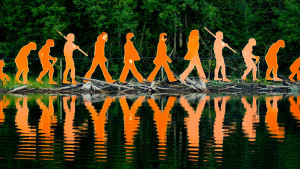In our competitive world, what were you made for? SIGNS editor David Edgren poses the question.
"I was made for marching!” shouted the tiny toy soldier. Without missing a beat he deftly manoeuvred himself around the Inventor and marched purposefully away, bashing his cymbal.
The next wooden warrior approached the Inventor. The old man held out his hand, stopped the tightly wound toy and asked, “Would you like to take a rest?”
Like the first, this toy soldier proclaimed his inalienable right to march and his determination to do just that. The marching man leaned into the palm of the Inventor's hand and, pushing for all he was worth, shouted, “I was made for marching!” Slowly the hand lifted and the marching man continued his bashing and dashing.
As the Inventor stopped the third toy soldier, he gently lifted it off the ground, “You've been marching well! Would you like to take a rest?”
The toy feet kept marching in midair. The cymbal kept crashing. And the little winding key on his back continued spinning. But the little voice said, “Yes, sir. I would like a rest.”
The Inventor gently locked the winding key in place and sat the now-still marching man on his lap. The two sat quietly in the din of crashing and marching—watching the other two soldiers buzz busily about the room. They watched as one ran into a table leg, fell over and rapidly spent the last of his energy noisily kicking the air. The other butted up against the wall and played his last few crashes going nowhere. All three toy soldiers were quiet now. The silence in the room became deafening as the little soldier, resting in the master's care, pondered what had happened. Finally, the little creature turned to his Creator and asked, “Sir, what happened to my friends? Why did they stop?”
The fatherly Inventor opened his palms in a helpless gesture, “They wore themselves out. I offered them rest.”
“But, Sir,” said the littlest soldier, “why didn't you make them rest? Surely you knew they would wear down!”
“Yes,” said the old man. “Indeed, I did know. But they were right. I created them to march—just as I created you to. They could've rested if they chose. Rest is for the weary and the wise.”
Staring down at his fallen comrades, the little wooden soldier quivered, “How long will I last?”
“At the rate you're going,” laughed the old man as he stroked the little soldier's head and wound up the key in his back, “I reckon you'll last forever!”
In this competitive world, there's precious little time for rest. And when we do get a moment to spare, we rush out to the mall or seek entertainment that distracts but hardly qualifies as real rest.
Then there's the well-planned holiday, with a gruelling itinerary that leaves us depleted and unrefreshed.
When was the last time you drove to work in complete silence? Or sat on a park bench for an hour?
What about a whole day? When was the last time you took a day and just rested?
During this athletic carnival atmosphere surrounding us throughout the Commonwealth Games, one of the things that we rarely consider is just how much time the finely tuned athletes we're watching actually spend resting. They will spend more time in rest and relaxation as part of their training regimen.
Nancy Clark, an endurance athlete trainer in the United States, boldly declares, “Erase the thought ‘I'm lazy if I take a day off.' Taking a rest day is being smart, not lazy! ... You have a better chance of beating your competitors if you enter the event well rested, not overtrained. Don't be one to lament ‘I wish I had rested more before my event.'”1
It is a common training practice for track-and-field athletes to have one passive rest day per week. Why? Because it is good for them!
Similarly, a rest day is good for you. In fact, if we look into the original plan established by the Creator of life, we notice an interesting conclusion to His work week. God spent six days creating Earth. And then on the seventh day, God rested. “And God blessed the seventh day and made it holy, because on it he rested from all the work of creating that he had done” (Genesis 2:3). If the Creator of life rested after just a week of work, surely we could benefit from doing the same. Actually it's more than an assumption; it's a divine command, “Remember the Sabbath [seventh] day by keeping it holy ... on it you shall not do any work” (Exodus 20:8, 10). How's that for a tough law? Rest!
So, if God—the Creator of we mere mortals—requires us to rest, why doesn't He force us to do so? Jesus answered this very question by saying, “Sabbath was made for man, not man for the Sabbath” (Mark 2:27).
We were, indeed, created to march. We are busy. We are loud. We are incessant! But we need rest. Our bodies repair. Our minds relax. And our sanity returns. That is why our fatherly Inventor, in His wisdom, created an entire day, just for us to rest!
Next time you feel the Divine hand on your forehead slowing you down—listen to that gentle voice, “You've been marching well! Would you like to take a rest?” Just do it! Stop. Rest in the arms of your Creator. He will replenish you. He promised, “Come to me, all you who are weary and burdened, and I will give you rest” (Matthew 11:28).
Just like the key in the middle of the toy soldier's back, we too have a key to health, long life and happy relationships. That key is rest.






